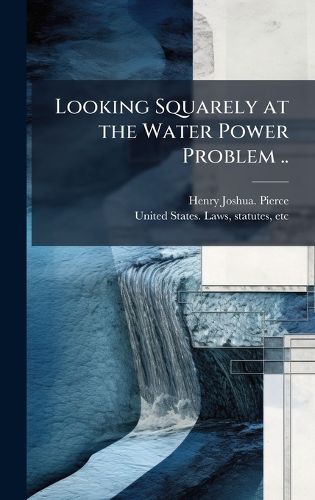Readings Newsletter
Become a Readings Member to make your shopping experience even easier.
Sign in or sign up for free!
You’re not far away from qualifying for FREE standard shipping within Australia
You’ve qualified for FREE standard shipping within Australia
The cart is loading…






"Looking Squarely at the Water Power Problem" examines the legal and practical aspects of water power development in the early 20th century. Authored by Henry Joshua Pierce, with reference to United States laws from 1914, this work delves into the challenges and opportunities surrounding the utilization of water resources for power generation. It offers insights into the regulatory environment and engineering considerations of the time, making it a valuable resource for understanding the historical context of hydroelectric power and water management. The book provides a snapshot of the early debates and legislative efforts related to harnessing water power, relevant to legal scholars, historians of technology, and anyone interested in the evolution of energy policy.
This work has been selected by scholars as being culturally important, and is part of the knowledge base of civilization as we know it. This work was reproduced from the original artifact, and remains as true to the original work as possible. Therefore, you will see the original copyright references, library stamps (as most of these works have been housed in our most important libraries around the world), and other notations in the work.
This work is in the public domain in the United States of America, and possibly other nations. Within the United States, you may freely copy and distribute this work, as no entity (individual or corporate) has a copyright on the body of the work.
As a reproduction of a historical artifact, this work may contain missing or blurred pages, poor pictures, errant marks, etc. Scholars believe, and we concur, that this work is important enough to be preserved, reproduced, and made generally available to the public. We appreciate your support of the preservation process, and thank you for being an important part of keeping this knowledge alive and relevant.
$9.00 standard shipping within Australia
FREE standard shipping within Australia for orders over $100.00
Express & International shipping calculated at checkout
"Looking Squarely at the Water Power Problem" examines the legal and practical aspects of water power development in the early 20th century. Authored by Henry Joshua Pierce, with reference to United States laws from 1914, this work delves into the challenges and opportunities surrounding the utilization of water resources for power generation. It offers insights into the regulatory environment and engineering considerations of the time, making it a valuable resource for understanding the historical context of hydroelectric power and water management. The book provides a snapshot of the early debates and legislative efforts related to harnessing water power, relevant to legal scholars, historians of technology, and anyone interested in the evolution of energy policy.
This work has been selected by scholars as being culturally important, and is part of the knowledge base of civilization as we know it. This work was reproduced from the original artifact, and remains as true to the original work as possible. Therefore, you will see the original copyright references, library stamps (as most of these works have been housed in our most important libraries around the world), and other notations in the work.
This work is in the public domain in the United States of America, and possibly other nations. Within the United States, you may freely copy and distribute this work, as no entity (individual or corporate) has a copyright on the body of the work.
As a reproduction of a historical artifact, this work may contain missing or blurred pages, poor pictures, errant marks, etc. Scholars believe, and we concur, that this work is important enough to be preserved, reproduced, and made generally available to the public. We appreciate your support of the preservation process, and thank you for being an important part of keeping this knowledge alive and relevant.